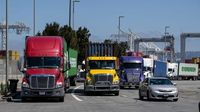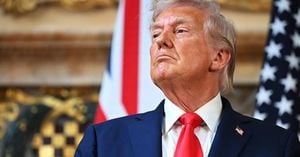The long-standing battle over who gets to set America’s air quality rules reached a boiling point this week as the U.S. Department of Justice (DOJ) filed lawsuits against California, challenging its authority to enforce stricter emissions standards for heavy-duty trucks. The legal action, announced on August 15, 2025, marks the latest escalation in a saga that pits President Donald Trump’s administration against California’s Democratic leadership and environmental advocates.
At the heart of the dispute is California’s Clean Truck Partnership, a 2023 pact between the California Air Resources Board (CARB) and major truck and engine manufacturers. The agreement committed companies such as Daimler and Volvo to phase in zero-emissions technology for heavy-duty trucks, aiming to eliminate the sale of new diesel trucks by 2036. In return, CARB agreed to work with manufacturers, offering more lead time to meet evolving regulatory requirements. According to KQED, the partnership was designed to ensure that California could continue its push for cleaner air regardless of shifting federal winds—or legal challenges.
But the federal government, now under President Trump, sees things differently. The DOJ filed two complaints in federal courts—one in California and another in Illinois—alleging that CARB is circumventing federal law by enforcing regulations that Congress and the President have already declared void. The lawsuits name CARB Director Steven S. Cliff and Governor Gavin Newsom as defendants, arguing that the Clean Truck Partnership functions as a de facto nationwide ban on internal-combustion engines in heavy-duty trucks by 2036.
"Agreement, contract, partnership, mandate — whatever California wants to call it, this unlawful action attempts to undermine federal law," said Adam Gustafson, acting assistant attorney general for the DOJ’s Environment and Natural Resources Division, in a statement on Friday. He added, "President Donald Trump and Congress have invalidated the Clean Air Act waivers that were the basis for California's actions. CARB must respect the democratic process and stop enforcing unlawful standards." (Axios, KQED)
The legal wrangling follows President Trump’s June 2025 move to revoke Environmental Protection Agency (EPA) waivers that had previously allowed California to set its own, more stringent emissions standards. These waivers, granted more than 100 times since 1967, had long enabled California to lead the nation in air quality protections—often with other states following its lead. The Biden administration had restored two such waivers for California just before leaving office, but Trump’s administration quickly moved to invalidate them, including California’s planned ban on new gasoline-powered cars by 2035.
California’s unique geography and heavy vehicle use have given it the dubious honor of having some of the nation’s worst air pollution, according to the American Lung Association. With roughly 400,000 heavy-duty diesel vehicles registered in the state and about 1.8 million medium- and heavy-duty trucks on its roads, the stakes are high for both public health and the trucking industry. CARB has repeatedly argued that its stricter standards are necessary to meet the state’s obligations under the Clean Air Act and to protect its residents from harmful diesel emissions.
Yet, the DOJ isn’t alone in challenging California’s approach. Earlier in the week, four major truckmakers—including Daimler and Volvo—filed their own lawsuits to block the state from enforcing its stricter emissions rules. The manufacturers claim they’re “caught in the crossfire” between state and federal regulators, facing conflicting demands that could disrupt their business and the broader trucking sector.
Environmental advocates, however, see the lawsuits as part of a broader rollback of environmental protections under President Trump. Brian Beveridge, executive director of the West Oakland Environmental Indicators Project, told KQED, “We’re awash in diesel emissions and this administration doesn’t care. It’s been amazing to me how the minute the administration took on this kind of a fight, all of these industries just decided, ‘The gloves are off, we don’t have to do any of that stuff.’”
Andrea Issod, a senior attorney with the Sierra Club’s Environmental Law Program, pushed back against the narrative that manufacturers are victims. “They’re painting this story that they’re caught between the federal and state regulators and the trucking companies are the victims,” she said. “It’s apparent they’ve been working with the Trump administration to back out of the obligations that they made with California.” Issod also noted that California is likely to find creative ways to reduce pollution, regardless of the legal outcome.
The Federal Trade Commission (FTC) recently closed its own investigation into whether the Clean Truck Partnership violated antitrust laws. The FTC concluded that the agreement forced manufacturers to produce zero-emissions engines rather than internal combustion engines, and that these requirements remained in place even if CARB’s regulations were later invalidated. This finding adds another layer of complexity to an already tangled legal and regulatory landscape.
For its part, CARB has declined to comment on the pending litigation. A spokesperson told Spectrum News that the agency could not discuss ongoing legal matters. Governor Gavin Newsom, also named in the lawsuits, has not issued a public statement on the matter as of press time.
The DOJ’s legal filings emphasize that the Trump administration is determined to end what it calls the “electric vehicle (EV) mandate,” level the regulatory playing field, and promote consumer choice in motor vehicles. “These actions advance President Donald J. Trump’s commitment to end the electric vehicle (EV) mandate, level the regulatory playing field, and promote consumer choice in motor vehicles,” the DOJ stated in its press release (Reuters).
The outcome of these lawsuits could have far-reaching implications, not just for California but for the entire country. More than a dozen states have historically adopted California’s vehicle emissions standards, leveraging the state’s regulatory muscle to drive national change. If the courts side with the DOJ, California’s ability to set its own course on clean air could be dramatically curtailed, shifting the balance of power back to Washington and potentially stalling progress on climate goals.
On the other hand, if California prevails, it would reaffirm the state’s role as a national leader in environmental policy and could embolden other states to pursue aggressive action on climate change—regardless of who occupies the White House. For now, the only certainty is that the fight over who gets to write the rules for America’s air is far from over, and the outcome will be closely watched by policymakers, industry, and the public alike.
As the legal dust settles, the trucks keep rolling across California’s highways, and the debate over emissions, federalism, and the future of clean air continues to rage on.





